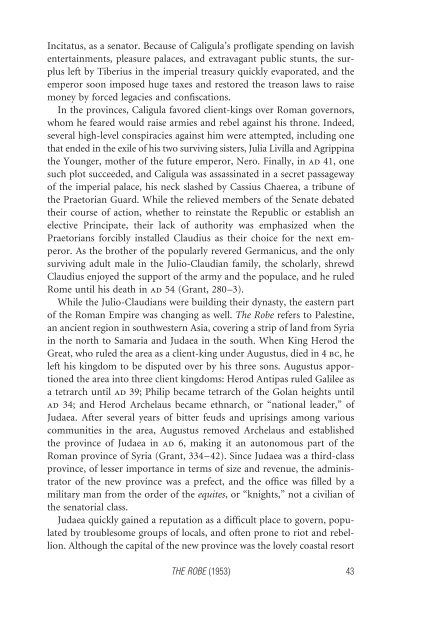Big Screen Rome - Amazon Web Services
Big Screen Rome - Amazon Web Services
Big Screen Rome - Amazon Web Services
Create successful ePaper yourself
Turn your PDF publications into a flip-book with our unique Google optimized e-Paper software.
Incitatus, as a senator. Because of Caligula’s profligate spending on lavish<br />
entertainments, pleasure palaces, and extravagant public stunts, the surplus<br />
left by Tiberius in the imperial treasury quickly evaporated, and the<br />
emperor soon imposed huge taxes and restored the treason laws to raise<br />
money by forced legacies and confiscations.<br />
In the provinces, Caligula favored client-kings over Roman governors,<br />
whom he feared would raise armies and rebel against his throne. Indeed,<br />
several high-level conspiracies against him were attempted, including one<br />
that ended in the exile of his two surviving sisters, Julia Livilla and Agrippina<br />
the Younger, mother of the future emperor, Nero. Finally, in ad 41, one<br />
such plot succeeded, and Caligula was assassinated in a secret passageway<br />
of the imperial palace, his neck slashed by Cassius Chaerea, a tribune of<br />
the Praetorian Guard. While the relieved members of the Senate debated<br />
their course of action, whether to reinstate the Republic or establish an<br />
elective Principate, their lack of authority was emphasized when the<br />
Praetorians forcibly installed Claudius as their choice for the next emperor.<br />
As the brother of the popularly revered Germanicus, and the only<br />
surviving adult male in the Julio-Claudian family, the scholarly, shrewd<br />
Claudius enjoyed the support of the army and the populace, and he ruled<br />
<strong>Rome</strong> until his death in ad 54 (Grant, 280–3).<br />
While the Julio-Claudians were building their dynasty, the eastern part<br />
of the Roman Empire was changing as well. The Robe refers to Palestine,<br />
an ancient region in southwestern Asia, covering a strip of land from Syria<br />
in the north to Samaria and Judaea in the south. When King Herod the<br />
Great, who ruled the area as a client-king under Augustus, died in 4 bc, he<br />
left his kingdom to be disputed over by his three sons. Augustus apportioned<br />
the area into three client kingdoms: Herod Antipas ruled Galilee as<br />
a tetrarch until ad 39; Philip became tetrarch of the Golan heights until<br />
ad 34; and Herod Archelaus became ethnarch, or “national leader,” of<br />
Judaea. After several years of bitter feuds and uprisings among various<br />
communities in the area, Augustus removed Archelaus and established<br />
the province of Judaea in ad 6, making it an autonomous part of the<br />
Roman province of Syria (Grant, 334–42). Since Judaea was a third-class<br />
province, of lesser importance in terms of size and revenue, the administrator<br />
of the new province was a prefect, and the office was filled by a<br />
military man from the order of the equites, or “knights,” not a civilian of<br />
the senatorial class.<br />
Judaea quickly gained a reputation as a difficult place to govern, populated<br />
by troublesome groups of locals, and often prone to riot and rebellion.<br />
Although the capital of the new province was the lovely coastal resort<br />
THE ROBE (1953) 43



